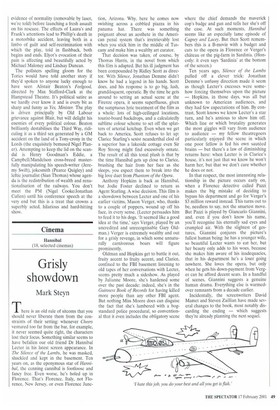Hannibal (18, selected cinemas)
Grisly showdown
Mark Steyn
There is an old rule of sitcoms that you should never liberate them from the constraints of their setting: whenever Cheers ventured too far from the bar, for example, it never seemed quite right, the characters lost their focus. Something similar seems to have befallen our old friend Dr Hannibal Lecter in his latest screen appearance. In The Silence of the Lambs, he was masked, shackled and kept in the basement. Ten years on, as the eponymous star of Hannibal, the cunning cannibal is footloose and fancy free. Even worse, he's holed up in Florence. That's Florence. Italy, not Florence, New Jersey, or even Florence June
tion, Arizona. Why, here he comes now swishing across a cobbled piazza in his panama hat. There was something poignant about an aesthete in the American penal system that's irretrievably lost when you stick him in the middle of Tuscany and make him a wealthy art curator.
That decision was taken, of course, by Thomas Harris, in the novel from which this film is adapted. But his ill judgment has been compounded by Ridley Scott as director. With Silence, Jonathan Demme didn't know he had a legend in his hands. Scott does, and his response is to go big, lush, grandiloquent, operatic. By the time he gets around to setting an actual scene at the Firenze opera, it seems superfluous, given the sumptuous lyric treatment of the film as a whole: lots of high-ceilinged locations, tourist-board backdrops, and a calculatedly sublime colour scheme to set off the splatters of arterial ketchup. Even when we get back to America, Scott refuses to let up: Clarice Starling's sexist neanderthal clod of a superior has a lakeside cottage even Sir Roy Strong might find excessively ornate. The result of all this tonal plush is that by the time Hannibal gets up close to Clarice, brushing the hair from her face as she sleeps, you expect them to break into the big love duet from Phantom of the Opera.
Anthony Hopkins is back as Hannibal, but Jodie Foster declined to return as Agent Starling. A wise decision. This film is a showdown between Lecter and one of his earlier victims, Mason Verger, who, thanks to a couple of poppers, wound up off his face, in every sense. (Lecter persuades him to feed it to his dogs. It seemed like a good idea at the time,' says Verger, played by an uncredited and unrecognisable Gary Oldman.) Verger is extremely wealthy and out for a grisly revenge, in which some unnaturally carnivorous boars will figure prominently.
Oldman and Hopkins get to battle it out, fruity accent to fruity accent, and Clarice, confined to the FBI basement listening to old tapes of her conversations with Lecter, seems pretty much a sideshow. As played by Julianne Moore, she's hardened some over the past decade: indeed, she's in the Guinness Book of Records for having killed more people than any other FBI agent. But nothing Miss Moore does can disguise the fact that she's lumbered with a bogstandard police procedural, so conventional that it even includes the obligatory scene
where the chief demands the maverick cop's badge and gun and tells her she's off the case. At such moments, Hannibal seems like an especially lame episode of Cagney and Lacey. But then Scott remembers this is a B-movie with a budget and cuts to the opera in Florence or Verger's château or the pig-farm in Sardinia. (Honestly: it even says 'Sardinia' at the bottom of the screen.) Ten years ago, Silence of the Lambs pulled off a clever trick: Jonathan Demme's unfussy direction made it seem as though Lecter's excesses were somehow forcing themselves upon the picture — Hopkins, in those days, was all but unknown to American audiences, and they had few expectations of him. By contrast, Scott knows we know Lecter's a star turn, and he's anxious to show him off. Which line or which brutality generates the most giggles will vary from audience to audience — my fellow theatregoers particularly enjoyed the scene in which one poor fellow is fed his own sautéed brains — but there's a law of diminishing returns here: when Lecter is in Clarice's house, it's not just that we know he won't harm her, but that we don't care whether he does or not.
In that respect, the most interesting relationship in the picture occurs early on, when a Florence detective called Pazzi makes the big mistake of deciding to bypass his department and go for Verger's $3 million reward instead. This turns out to be, needless to say, not the smartest move. But Pazzi is played by Giancarlo Giannini, and, even if you don't know his name, you'll recognise his eternally sad eyes and crumpled air. With the slightest of gestures, Giannini conjures the picture's fullest human being: he has a younger wife, so beautiful Lecter wants to eat her, but her beauty only adds to his woes, because she makes him aware of his inadequacies, that in his department he's a loser going nowhere. She loves the opera, but only when he gets his down-payment from Verger can he afford decent seats. In a handful of scenes, Giannini suggests a genuine human drama. Everything else is warmedover remnants from a decade earlier.
Incidentally, the screenwriters David Mamet and Steven Zaillian have made several changes to the book, most notably discarding the ending — which suggests they're already planning the next sequel.


































































 Previous page
Previous page